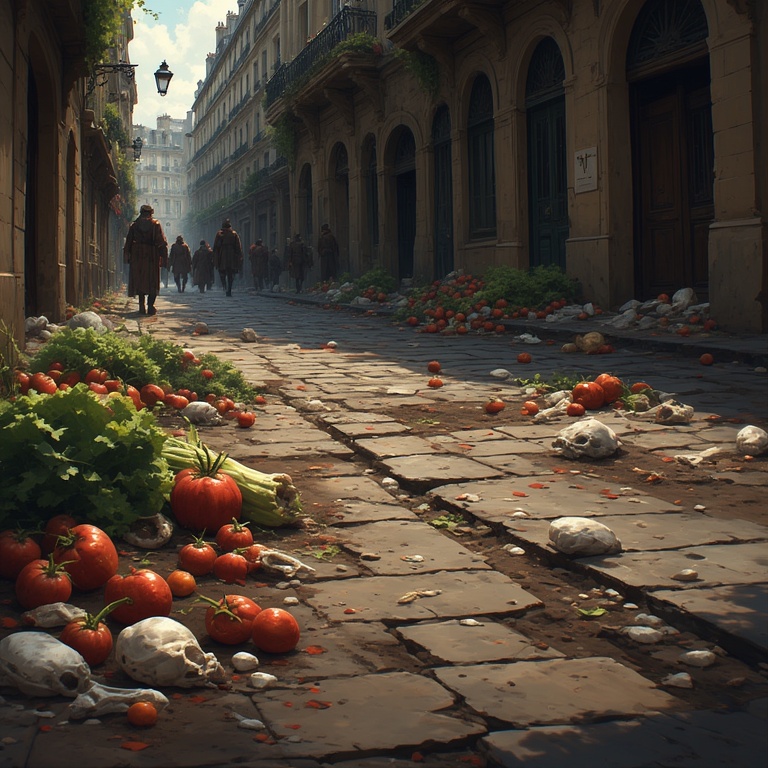❗❗ You should read the full article in French available here. This article is aimed at French learners having a B2 to a C1 level in the language. Should your level be lower than that, I still recommend you read first the article in French and try to get the gist of the story and then check with this version in English how much you understood. Happy learning!

The Trash Can, an Everyday Object
The trash can is an invention that has revolutionized the world. It can be found almost everywhere and is one of those little everyday things we take for granted. However, there was a time when trash cans didn’t exist[1]. How did we manage without them? Who invented it? These are all questions that the first article in the series “Little Cultural Anecdotes About France” will answer.
Life before the invention of the trash can

Did you know that during the Renaissance, excrement and other waste from human activity was thrown out of windows and into the streets? Farmers would go into the streets to collect mud mixed with excrement and other detritus to fertilize their fields. For cities with a river, such as the Seine in Paris, this was where the waste was dumped. Needless to say, hygiene was poor, and this general state of filth encouraged the outbreak of very serious disease epidemics, such as the plague in 1522.
Who invented the trash can?

Despite several attempts by different governments to implement street cleaning, the reluctance of the French to change their habits made the creation of more hygienic automation very slow! It was in 1884 that [2], ou l’invention du traitement des ordures ménagères : https://artsandculture.google.com/story/bAVRFgJzbfSQJg?hl=fr” class=”js–wpm-format-cite”>Eugène Poubelle[2], then prefect of the city of Paris, made it mandatory to deposit waste in special containers with a lid to get rid of household waste in front of the door of homes. It was therefore on November 24, 1883, the date the decree came into force, that the trash can, now used throughout the world, was created!
| Vocabulaire | Définition | Anglais |
| La Renaissance | Période historique et artistique qui naît en Europe autour du XVe siècle. | Renaissance |
| Un déchet | Résidu inutilisable. | waste |
| Atterrir | Se poser au sol. | to land |
| Un agriculteur (féminin: une agricultrice) | Personne qui cultive la terre ou élève des animaux. | a farmer |
| Récupérer | Recouvrer. | to retrieve |
| La boue | Terre mouillée. | mud |
| Être doté de | Avoir en sa possession quelque chose d’avantageux. | to be equipped with |
| Il va sans dire que | Il est évident que. | it goes without saying |
| La crasse | La saleté. | filth |
| Une épidémie | Maladie infectieuse contagieuse qui apparaît et se propage chez un grand nombre de personnes. | epidemic |
| La peste | Maladie très contagieuse et mortelle causée par le bacille Yersinia pestis. | plague |
| 1522 | Mille-cinq-cent-vingt-deux. | |
| Le nettoyage | Action d’enlever la saleté et la poussière. | cleaning |
| La réticence | Réserve, hésitation. | reluctance |
| 1884 | Mille-huit-cent-quatre-vingt-quatre. | |
| Le préfet | Un préfet est un fonctionnaire qui a pour rôle de représenter le pouvoir exécutif central au sein d’une préfecture. | a prefect |
| Le dépôt | Action de poser quelque part. | a drop-off |
| Un couvercle | Fermeture d’un contenant. | a lid |
| Se débarrasser de | Se séparer de quelque chose qui n’est plus voulu. | to get rid of |
| Les ordures ménagères | Les déchets que les gens mettent dans la poubelle chez eux. | household trash |
| Un logement | Bâtiment dans lequel on réside. | an accomodation |
| 1883 | Mille-huit-cent-quatre-vingt-trois | |
| L’entrée en vigueur de | La mise en application de quelque chose. | coming into effect of |
| Un arrêté | Une règle créée par une institution administrative. | a decree |
| Désormais | Dorénavant. | from now on |
Bibliography
- [1] L’histoire des déchets : https://sitetom.syctom-paris.fr/les-dechets/lhistoire-des-dechets.html#:~:text=En%201884%2C%20Eug%C3%A8ne%20Poubelle%20ordonne,nom%20de%20nos%20%22poubelles%22%20!
- [2] Eugène Poubelle, ou l’invention du traitement des ordures ménagères : https://artsandculture.google.com/story/bAVRFgJzbfSQJg?hl=fr

